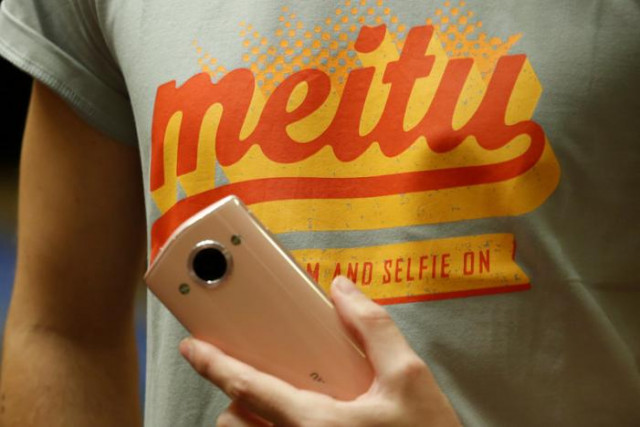Is the cute Meitu app really a threat to our online privacy?
VPN is our best bet now

A model poses with a Meitu smartphone during Meitu IPO news conference in Hong Kong, China December 2, 2016. PHOTO: REUTERS
But now, things have changed drastically. Everything we do leaves a trace on the internet, and there are so many companies doing everything to obtain our personal data to make profit. There are a lot of things hackers, companies, and even government agencies can do to monitor our internet activities, posing a threat to our online security. Some of these threats involve mobile applications that we install in our smartphones.
In fact, there is one that is under the spotlight right now—Meitu, a selfie application that recently gained popularity due to its cute photo-editing features. That sounds so funny, right? It is just hard to believe that a simple selfie application can harm us in any way. But no matter how crazy it sounds, some experts believe that Meitu is doing something very suspicious with its users’ data.
What’s Meitu?
With its most noteworthy feature, cute animal-like filters, Meitu is a huge sensation right now. It also has a face recognition feature which lets users edit anyone’s face on their phone storage with no hassle.
Mobile hacking: Govt alerted to Indian cyber espionage
It also has the vibe of the old-school photo sticker booths that were really popular back in the early 2000s. (If you have no idea how those machines look like, you are clearly too young to have your own smartphone.)
In China, its home country, Meitu has been around since 2008. But for the rest of the world, it just gained its fame in the last couple of months.
Tricks up its sleeve
Meitu’s features are interesting. The application is free and it only takes a few minutes to make your face look flawless, which is completely safer than a nip or tuck procedure.
But experts have said it contains suspicious code, and not even iOS devices are safe from it. Reportedly, the code lets the application identify the user’s phone, which is normal for selfie apps, as they need to access the phone’s camera and storage. However, it also asks permission to run the application automatically when the phone starts and change the audio settings. It even wants to know your location.
What business does a photo-editing app have with all of that? Well, some experts speculated that it is because Meitu is not only collecting users’ data, but also selling it to third parties.
WhatsApp vulnerable to snooping, reveals report
The creators of the app certainly denied the accusations, saying that the app only uses customers’ personal data to upgrade user experience and all that jazz. But the problem is, it is reported that Meitu is still creeping and accessing your personal data even when the phone is in sleep mode. So, maybe it does have some tricks up its sleeve.
What can we do?
So, is there still a way to stay safe online now that we know a huge threat to our privacy can even hide behind such a cute application? Well, it is safe to say that a surefire way to be safe doesn’t really exist, but we still need to do something.
VPN is our best bet now. Not only can it keep us anonymous online but it can also help us get through geographical restrictions (and this can be really useful when we want to watch Netflix and chill). But we still can’t be completely safe with VPN, especially when we deal with shady apps. There are some free versions of this technology that are openly selling user’s bandwidth. This is why we need to be careful in choosing the service we want to use.
Watching what we click and download is also a good idea because a majority of adware and malware come from the things we click. As for Meitu, let’s just be careful until we have proof that it is indeed completely safe.
This article originally appeared on Tech in Asia.

















COMMENTS
Comments are moderated and generally will be posted if they are on-topic and not abusive.
For more information, please see our Comments FAQ